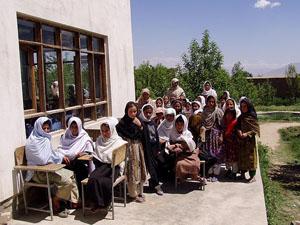Building schools in Afghanistan
A school in Afghanistan (Image: thechildrenofwar, Creative Commons)
Greg Mortenson, co-author of the mega-bestseller Three Cups of Tea, has his own version of the debate over guns versus butter. How much a society spends on military needs versus civilian needs comes down to bombs versus books, or as Mortenson puts it, peace through literacy.
Three Cups of Tea tells the story of how in attempting and failing to climb K2, one of the highest Himalayan peaks, Mortenson stumbled lost in the mountains into a Pakistani village and a new life as a builder of schools. He’s done so well, he caught the attention of the U.S. military, just as the Obama administration is increasing troop levels in Afghanistan.
Mortenson sat down with “Here and Now’s” Robin Young to talk about drinking tea, building schools, and advising the U.S. military.
The U.S. military started contacting Mortenson a year and a half ago, including USCENTCOM Commander General David Petraeus. “He said he had read Three Cups of Tea and he sent me three bullet points. This is what he learned from the book: number one, build relationships; number two, have respect; and number three, that we need to listen to people, we need to listen. In many ways our military commanders, they’ve been in Afghanistan three or four times and they really get it that what is most important is to build relationships.”
Mortenson says he isn’t getting paid, but as a volunteer he is advising military commanders on cultural sensitivity and the significance of education. He quotes Lt. Col. Christopher Kolenda as saying “ultimately this is a war that will not be won with bombs and bullets, but with books and ideas that excite the imagination towards peace, tolerance and prosperity.”
Lt. Col. Kolenda isn’t the only one taking notice. Several Congressmen have nominated Mortenson for the Nobel Peace Prize. At the same time the Obama administration is planning a sharp troop increase in Afghanistan, signaling a switch in strategy from reconstruction to fighting the Taliban. Greg Mortenson disagrees with this strategy:
“I’ve talked to our top military commanders, spent a lot of time with them. And even they will tell you that there’s no military solution in Afghanistan, that it’s absolutely not possible. What I think our administration is thinking about is what I call fire power. But if you talk to our military leaders they say that people over there need brain power, and brain power means training, supplies for their army, for their police, but mostly education.”
Mortenson is concerned that the administration is increasing troop levels without consulting with the Afghan people. He says Afghan leaders will all agree that what they need are training, supplies, and education. On the other hand, military leaders like General Petraeus are drinking tea as Mortenson learned to do, “they’re meting with the people, they’re listening to them and that’s really the key to, I think, peace.”
The drinking tea analogy comes from Mortenson’s experience and setbacks building schools in the region. He spent three years trying to get the first school built. One day a village chief pulled him aside and explained, “if you want to do business here, you need to have three cups of tea. First cup you’re a stranger, second cup a friend, and third cup you’re family.” The chief then locked up Mortenson’s plumb line, receipts and records and told him not to worry. Six weeks later the school got built.
“It was an important lesson to let go and empower communities. And that is kind of the key to all our schools now. We provide skilled labor, material and teacher training. But they provide free land, free resources, free wood and free sweat equity.”
Mortenson’s argument for reconstruction seems to be disconnected from the Obama administration’s decision to go after the Taliban. Mortenson agrees that there’s a need for security. But he points out that the Taliban has been targeting and destroying schools for girls. “And what they fear most is if that girl grows up, gets an education, they’ve lost the ability to get recruits.” Mortenson believes that if women are educated, they are much less likely to condone violence or terrorism on the part of their sons.
Some NGOs have been critical of Mortenson for getting too close to the military. There’s a fear that unarmed aid workers will be endangered in the field if too closely associated with the military. But Mortenson says he will meet with anyone who wants to talk about education whether it’s the U.S. military or the Taliban. He is also clear that he has never received U.S. federal funding, despite several offers from the government. Mortenson doesn’t believe the military should be directly involved in building schools. On the other hand, he notices that few aid workers are left in many areas of Afghanistan, whereas he projects the military will be there at least ten more years.
But at the end of the day, Mortenson believes education is the only solution to the ongoing conflict:
“The immediate solution though is not an immediate deployment of 20 or 30 thousand more U.S. troops, that’ll only escalate the violence. The real enemy is ignorance and it’s ignorance that breeds hatred. And to overcome that I think we need to have courage and compassion, but most of all I think education is the key.”
"Here and Now" is an essential midday news magazine for those who want the latest news and expanded conversation on today’s hot-button topics: public affairs, foreign policy, science and technology, the arts and more.
